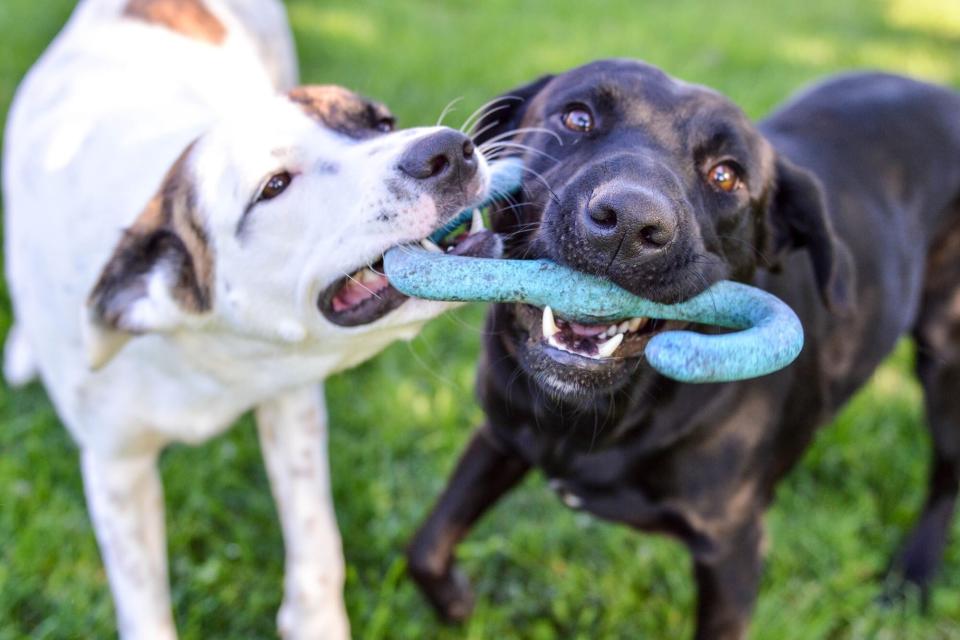Can Dogs Get the Flu? What You Need to Know About Canine Influenza
TABLE OF CONTENTS
On This Page
Can Dogs Get the Flu from Humans?
How Dog Flu Spreads
Signs and Symptoms
Treatment
Prevention
Unfortunately, getting sick is just a part of life—Even for our dogs. Dogs can and do get the flu, but it's different from the flu humans get. For dogs, this is an almost purely respiratory illness (unlike human versions which can include the stomach flu).
There are two distinct viruses that cause canine flu or influenza. The first dog flu virus to be isolated in North America was the H3N8 influenza virus in 2004 in Florida in racing greyhounds. The second one, which showed up in Chicago in 2015, is the H3N2 canine influenza virus.
Can Dogs Get the Flu from Humans?
First, it is important to note that dogs and people don't share their flu viruses. So dogs can't get the flu from humans and vice versa. You could carry canine virus particles on your clothes if you were around a sick dog, but the risk is low. Still, change before petting your dog if you have any concerns of passing the virus from one dog to another.
RELATED: Can Dogs Get Colds?
How Dog Flu Spreads
Since these viruses are airborne, most dogs become infected from being around another dog who has the flu virus and coughs, barks, or sneezes—which puts the virus into the air that your dog then breathes in. It typically takes 2 to 4 days after exposure before you'll notice your dog showing signs of illness.
Dogs with the H3N8 flu virus are considered to be contagious for 10 days after exposure, while dogs with the H3N2 strain of flu can be contagious for up to 26 days. About a quarter of the dogs who are exposed and infected will not show any signs of illness but they can still spread the virus.

melissabrock1 / Getty
Virus particles can also live for a time on food and water dishes, toys, and blankets used by infected dogs. Coughing and sneezing dogs should be isolated from other dogs in your family.
RELATED: We Probably Need to Start Washing Our Dogs' Food Bowls More Often
Dog Flu Symptoms
Mild cases of dog flu can mimic other respiratory illnesses like a cold or kennel cough. Unfortunately, many cases are more serious. Dogs with canine flu show symptoms such as:
Coughing
Sneezing
Discharge from the eyes and nose
Difficulty breathing
Lethargy
Very serious cases can progress to pneumonia and some of these dogs can potentially die. It's important to seek prompt help from your veterinarian if you start to spot any of these signs of dog flu.
RELATED: Here's Why the Bordetella Vaccine Is So Important
Canine Influenza Treatment
There is no specific treatment for dog flu. Because this is a virus, antibiotics won't help, though if your dog gets a secondary pneumonia, your veterinarian will prescribe antibiotics for that. Very ill dogs will need hospitalization including supplemental oxygen.
If you notice your dog showing signs of canine flu, contact your vet. He or she may give you tips for home care such as feeding your dog chicken broth (low sodium please!), and possibly giving some extra vitamins or supplements to support his immune system.
RELATED: Here's When to Take Your Dog to the Vet
Cough suppressants are used in some cases, but do not give your dog human cough medications on your own! If your dog has a fever and is lethargic, has trouble breathing, and is not eating or drinking well, he should be seen at the vet clinic. Give the clinic a heads up that your dog has a respiratory illness as they will need to keep your dog isolated from other patients.
If your pup has any eye or nose discharge, gently clean the affected areas at least twice a day. Warm compresses are best for softening up crusty discharges, but test it on yourself to ensure it is not too hot before applying to your dog's skin.
Preventing Illness With Dog Flu Shots
Luckily, there is a vaccine that covers both versions of the canine flu virus. This is not a "core" vaccine, meaning it is recommended for dogs who are at risk of getting the flu, not all dogs.
If your dog goes to dog training classes, competes in dog sports, spends time at a boarding facility, or hangs out at doggy daycare, your vet will probably recommend the vaccination. Like the human versions of flu vaccines, the dog flu vaccine may not totally prevent any illness in your dog, but it should reduce the severity of symptoms.
RELATED: Understanding Puppy Shots: All the Vaccinations Your New Pup Will Need in Their First Year

